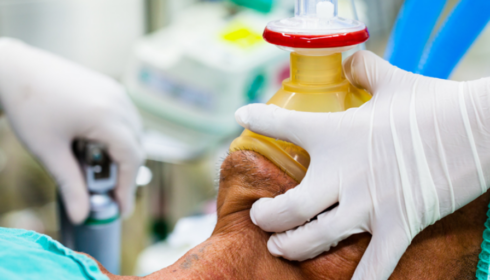VSE
VSE: Vasopressin, Steroids and Epinephrine and Neurologically Favourable Survival After In-Hospital Cardiac Arrest A Randomized Clinical Trial
Mentzelopoulos. JAMA.2013;310(3):270-279. doi:10.1001/jama.2013.7832
Clinical Question
- In patients in cardiac arrest, does vasopressin + epinephrine during CPR combined with steroid supplementation during and after CPR, improve survival to discharge with a good neurological outcome, in comparison to the use of epinephrine alone?
Design
- Randomized, double-blind, placebo-controlled, parallel-group trial
- blinding of staff assessing neurological outcome
- Block randomisation stratified by centre
- Modified intention to treat
- randomised patients who did not require vasopressors were excluded
- randomised patients that survived but who did not have post-resuscitation shock were excluded from subgroup analysis
- Based on a predicted survival with favourable neurological recovery of 15% in the intervention group and 4% in the control group, the study was powered at 80%, with alpha set at 0.05, if 244 patients enrolled.
- Multi-variance logistic regressions used to determine Odds Ratios (OR)
Setting
- 3 tertiary centres in Greece
- September 1, 2008, to October 1, 2010
Population
- Inclusion: in-hospital vasopressor-requiring cardiac arrest
- Location of cardiac arrest: 16% ED, 41% ICU/CCU/Operating room, 43% hospital ward
- Exclusion: age<18, terminal illness/DNAR, cardiac arrest due to exsanguination, pre-hospital cardiac arrest, treatment with IV steroids prior to arrest
- 300 randomised out of 364 assessed for eligibility
- 32 patients excluded post-randomisation as ROSC prior to need for vasopressors
- Comparing intervention vs. control group, similar baseline characteristics apart from:
- male sex 73.1% vs. 63.8%
- hospital stay before arrest (median) 5 days vs 2 days
- cause of cardiac arrest
- metabolic 8.5% vs 15.2%
- hypotension 46.9% vs. 37%
- myocardial ischaemia/infarction 23.1% vs. 17.4%
- Initial rhythm
- asytole 63.8% vs. 70.3%, P=0.3
- PEA 19.2% vs. 13%, P=0.19
- No significant differences in use of primary PCI or therapeutic hypothermia between study groups
Intervention
- Combination of
- vasopressin 20 IU/CPR cycle for 5 cycles
- adrenaline 1mg/CPR cycle
- steroids
- methylprednisolone 40mg during 1st cycle of CPR
- surviving patients received hydrocortisone 300mg/d for <7days and gradual taper if postresuscitation shock
- >4hrs requirement of vasopressors to maintain MAP >70 after volume loading, in patients not previously on vasopressors; (if already on vasopressors, >50% increase in vasopressors/inotropes)
Control
- Adrenaline 1mg/CPR cycle + placebos
Average CPR cycle duration ~3min in both intervention and control groups
Outcome
- Primary outcome:
- survival to hospital discharge with favourable neurological outcome (Glasgow-Pittsburgh Cerebral Performance Category 1/2)
- significant improvement in intervention group
- 13.9% vs. 5.1%; (OR 3.28, 95% C.I. 1.17-9.2, P=0.02, NNT 12)
- significant improvement in intervention group
- survival to hospital discharge with favourable neurological outcome (Glasgow-Pittsburgh Cerebral Performance Category 1/2)
- Secondary outcome:
- ROSC for >20 minutes (stated as a 2nd primary outcome, but power calculation not performed for this outcome)
- significant improvement in intervention group
- 83.9% vs. 65.9%, (OR 2.98 95% C.I. 1.39-6.4, P=0.005, NNT 6)
- significant improvement in intervention group
- Patients with post-resuscitation shock had significant improvement of survival to discharge with a good neurological outcome in the intervention group vs. control group
- 21.1% vs 8.2%, OR 3.74 (95% C.I. 1.2-11.62, P=0.02)
- Number of patients receiving insulin treatment within 1st 10 days – significantly higher in intervention group
- 50.4% vs. 36%, P<0.001
- There was no significant difference in rates of infection or gastro-intestinal bleeding between the two groups
- ROSC for >20 minutes (stated as a 2nd primary outcome, but power calculation not performed for this outcome)
Authors’ Conclusions
- Patient in cardiac arrest requiring vasopressors, have an improved survival with a good neurological outcome if they are treated with combined vasopressin/epinephrine/steroids compared with epinephrine alone
Strengths
- Randomised
- Double blinded, and blinding of those assessing neurological status
- Placebo controlled
Weaknesses
- Single geographical area
- Small number of patients in total survived with a good neurological outcome (25 in total) making it difficult to make any definite decisions
- Therapeutic hypothermia only used in 24.6% of patients
- Atropine and bicarbonate used on a number of patients which is not consistent with current practice
- Differences in baseline characteristics between the 2 groups
- Large number of patients had cardiac arrest in critical care environment. These results may be be generalisable to centres at which this does not happen.
- Bundle approach means that we do not know whether it was the whole bundle or any of the bundle elements that caused any differences in results found
The Bottom Line
- This study has shown a significant improvement for survival to discharge with a good neurological outcome following cardiac arrest when treated with combination steroids/vasopessin/epinephrine in comparison to epinephrine alone. Of note, no RCT has shown this improvement when using epinephrine alone compared with placebo.
- However, before introducing this into routine practice I am waiting for a validation study in a different setting. This is a single study, set in only 3 centres in 1 country. There were only 18 patients who survived with a good outcome in the intervention group. We know that a number of promising treatments have been disproven when studies have been repeated in larger trials. I hope that someone takes up the challenge of attempting to validate this trial on an urgent basis so that a more evidenced based decision can be made.
External Links
- [Article full text pdf] Vasopressin, Steroids and Epinephrine and Neurologically Favourable Survival After In-Hospital Cardiac Arrest A Randomized Clinical Trial
- [Review] Under Pressure Journal Club (Vasopressin, Steroids and Epinephrine in Cardiac Arrest) by SGEM
- [Commentary] Rob Mac Sweeney on Intra-Arrest Meds by EMCrit
- [Commentary] EMCritWee
Metadata
Summary author: @davidslessor
Summary date: 8 August 2014
Peer-review editor: @DuncanChambler





Pingback: Why You Should More Than Consider a Vasopressin, Steroid, and Epinephrine (VSE) Cocktail - R.E.B.E.L. EM - Emergency Medicine Blog
Pingback: VAM-IHCA – The Bottom Line